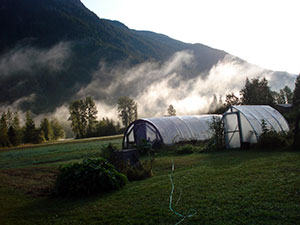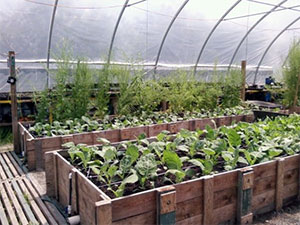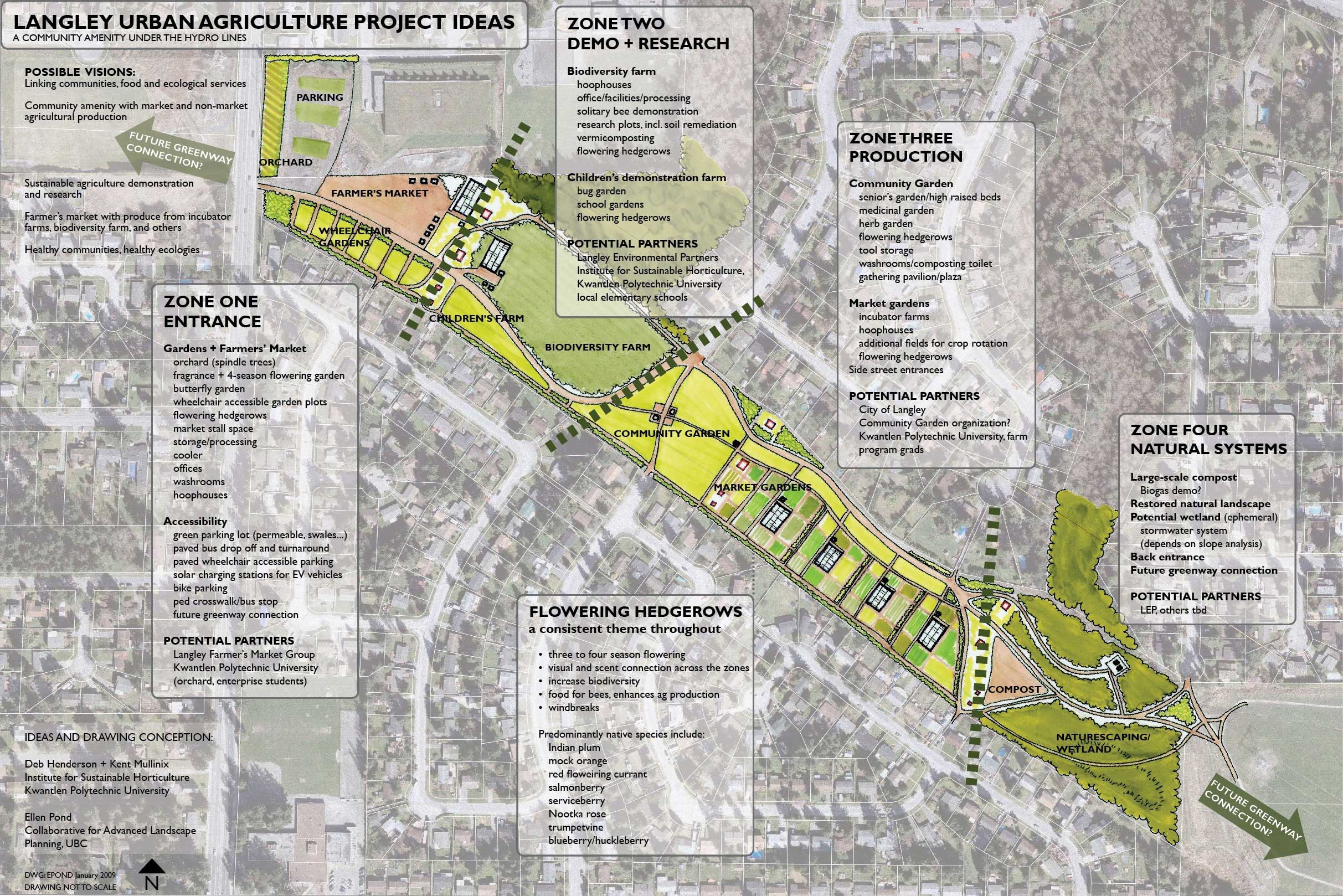Bioregional Food System Design and Planning: Southwest BC and Yukon
In an era of rising food prices, peak oil, peak water, climate change and environmental degradation, creating resilient agri-food systems has become a sustainability imperative. Community, government, and agriculture sector leaders are increasingly expressing concern about the vulnerabilities in our current agri-food systems, and there is growing evidence of a desire to improve regional food self-reliance while concomitantly creating jobs and enhancing regional economies. Disparate efforts to this end are being undertaken, and while these important initiatives are valuable, none in and of themselves constitute the comprehensive, integrated agri-food system design and plan that is required to accomplish these goals.
We are undertaking three-year, interdisciplinary research projects in the Yukon and in south-west British Columbia. The aim of this research is to develop, for each region:
- A bio-regional Food System Design (including production, wild and traditional food provisioning, processing, distribution, access, and waste management) that supports agriculture and food provisioning, strengthens the economy, promotes environmental stewardship, fosters food security and public health, maximizes food self-reliance, and strengthens communities; and,
- An Implementation Plan consisting of critical information and targeted tools to be used by existing and future farmers and food-sector entrepreneurs, consumers, and community, Government, and First Nations leaders to actualize the Bio-Regional Food System design.
In the Yukon, this research is being led by ISH in partnership with the Yukon Agricultural Association (YAA) and is funded in part by the YAA and the Canadian Agricultural Adaptation Program (CAAP). ISH researchers are working with the Whitehorse-based Arctic Institute for Community Based Research (AICBR) to develop the Territory-wide partnerships with community, industry, and government representatives (including First Nations Governments) that are considered critical to achieving project goals and ensuring that the research results are appropriate and useful for all Yukoners.
In South-West British Columbia, partial funding has been secured from the Real Estate Foundation of BC, with additional funding and support partnerships currently being negotiated with municipalities and regional districts, as well as industry stakeholders across the region.
Dedicated webpages for these projects are currently under construction; please check back soon for more information.
Surrey's Underutilized ALR Lands: An Analysis of their Economic and Food Production Potential in Direct Market Agriculture
In an effort to strengthen internal planning and policy for agriculture, the City of Surrey has partnered with Kwantlen Polytechnic University's Institute for Sustainable Horticulture (ISH) to conduct research aimed at strengthening municipal planning and policy for local, small lot agriculture on underutilized ALR lands in the municipality. In addition to contributing significant funding, Surrey will participate actively in this research initiative through data sharing, staff involvement, and in consultation with its Agricultural Advisory Committee (AAC).
The overarching objective of this research is to contribute extensive information and new knowledge to help Surrey's leadership begin to answer the complex questions:
What information, actions and policies can be employed in Surrey to:
- Halt further loss of lands from the ALR and A1 zones,
- Encourage food production on ALR lands currently underutilized for agriculture
- Enhance the economic viability of production of food for the local market on ALR lands that are currently underutilized for agriculture and position this local scale agriculture to become an economic development and employment driver that flourishes in complement to existing large scale commodity agriculture,
- increase consumption of locally produced and sold fresh fruits and vegetables,
- estimate how local scale direct market agriculture can be positioned to contribute then 80% reduction in Surrey's GHG emissions by 2050 as mandated by the Provincial government.
Principle Investigators: Kent Mullinix, Arthur Fallick, Caitlin Dorward,
Contributing Researchers: Marc Schutzbank, Parthi Krishnan, Ellen Pond, Glenis Canete, Sheryl Webster
Funded by The City of Surrey
For more information on about the project, contact principle investigator Kent Mullinix at kent.mullinix@kwantlen.ca.
To download a copy of the final report: Surrey's Underutilized ALR Lands: An Analysis of their Economic and Food Production Potential in Direct Market Agriculture.
Creating the Framework for a Regional Food System Management Plan: A Case Study of the Sea to Sky Bioregion
 The reality of rising food prices, climate change, peak oil and peak water has mobilized communities and municipal governments to take food security and sovereignty more seriously. However, there is a lack of 'how-to' guides or frameworks for developing local and regional food strategies that can be implemented.
The reality of rising food prices, climate change, peak oil and peak water has mobilized communities and municipal governments to take food security and sovereignty more seriously. However, there is a lack of 'how-to' guides or frameworks for developing local and regional food strategies that can be implemented.
The purpose of this project is to create a framework for a Regional Food System Management Plan (RFSMP) for the Sea to Sky bioregion, which encompasses the communities of Whistler, Squamish, Pemberton and Lillooet. This project will use a community supported, collaborative approach to promote sustainability by building capacity with the objective of enhancing food self-reliance.
Both quantitative and qualitative data will be collected, analyzed and interpreted to inform the RFSMP. The qualitative research will use a case study approach and involve a comprehensive literature review, comparison of existing food system strategies, and coordination of focus groups, semi-structured interviews, and a questionnaire (if required). The focus groups and interviews with community stakeholders will give individuals, businesses and organizations located in the bioregion the opportunity to provide their perspective, vision and values about local food issues. Community input will be a key strategic piece to informing the development of the management plan framework
Quantitative data will be collected through analysis of land-based production potential and per capita consumption in the bioregion. This data will be used to form a baseline and inform the modeling of conceptual frameworks for regional food self-sufficiency which will parlay directly into the development of the management plan. As well, data and information collected will be used to inform project participants during focus groups and interviews.
This research is intended as a model framework for other communities wishing to produce a Food System Management Plan.
Principle Investigator: Kent Mullinix
Research Associates: Laura Raimondi
Funded by Whistler Community Services Society
Langley-MESA Demonstration Site
The Sustainable Agri-Food Systems Working Group has partnered with the City of Langley, BC to assess the viability of a Municipally Enabled and Supported Agriculture (MESA) demonstration project utilizing a BC Hydro Right of Way. The project was initiated over two years ago when ISH partnering with the Collaborative Applied Landscape Planning (CALP) team at the University of British Columbia to produce a concept plan for the City of Langley, which provides an overall vision for the site. This vision sees the side divided into four distinct zones. Zone 1: The Entrance, is an area for public interaction and to host a farmers market, as well as for demonstration of sustainable accessibility features such as permeable green parking lots and bike parking. Zone 2: Demo and Research, will be an area dedicated to plots for research and demonstrations of organic gardening features. Zone 3: Production, is where community gardens and market gardens will be located and incubator farm space made available for graduates of the Richmond Farm School and other Kwantlen agriculture programs. Zone 4: Natural Systems, will be an area that will increase the biodiversity of the local area and provide ecosystem services. The entire site will incorporate flowering hedgerows and connect with adjacent greenways and habitat corridors.
Principle Investigators: Kent Mullinix, Arthur Fallick, Sheryl Webster
Funded by the City of Langley
Langley Urban Agriculture Demonstration Project - Project Proposal
Langley Urban Agriculture Demonstration Project - Promotional Brochure
Richmond Farm School
 Launched in 2010, the goal of the Farm School is to prepare people from all walks of life to engage in human scale, urban focused agriculture enterprises including production, processing, adding value, distribution, marketing and sales. Through a balance of theoretical (classroom) and applied (field/ practical) skills development, students in the 10 month program learn about economically viable, environmentally sound, socially responsive agri-food systems and practices through a sustainability lens.
Launched in 2010, the goal of the Farm School is to prepare people from all walks of life to engage in human scale, urban focused agriculture enterprises including production, processing, adding value, distribution, marketing and sales. Through a balance of theoretical (classroom) and applied (field/ practical) skills development, students in the 10 month program learn about economically viable, environmentally sound, socially responsive agri-food systems and practices through a sustainability lens.
Upon completion of the program, students will have developed the skills to engage in urban and/or peri-urban agriculture on a commercial basis. A unique aspect of the program is that graduates of the program will have access to "incubator" farmland (up to one acre for three years at very reasonable rates) to begin their agricultural enterprises. Technical support and shared equipment will also be available to incubator farmers.
The Richmond Farm School is a program of the Institute for Sustainable Horticulture, Kwantlen Polytechnic University, in cooperation with the Richmond Fruit Tree Sharing Project, the Richmond Food Security Society, City of Richmond and sponsored by VanCity,
For more information please visit the Richmond Farm School website or contact Farm School Coordinator Anna Rallings.
Sustainable Agriculture on the Southlands: Connecting People and Community with Agriculture
There is a growing body of literature suggesting that our agri-food systems need to be reconfigured in sustainable ways, and that adaptability and resilience requires more of a balance between local and global patterns of food production, distribution and consumption. This has important ramifications for how we design and retrofit communities to ensure that they flourish. In this research project we are working to advance a unique and dynamic approach for the full integration of a local agri-food system within the planning, design, development and function of urbanized communities thereby creating enhanced food security, economic opportunity and reconnecting urban-culture with agri-culture.
British Columbia is at an important crossroads in terms of issues of food security (supply) and food sovereignty (control). Local and regional authorities and the Government of British Columbia, have an opportunity to take a leadership role in the community of Tsawwassen, South Delta, BC with the proposed agriculture and community development project.
Kwantlen Polytechnic University's Institute for Sustainable Horticulture researched how Community Trust Farming (CTF), similar to land trusts, and related dimensions of local scale, human intensive and direct market agriculture can contribute directly and substantively to advancing the economic, social and ecological vitality and sustainability of the proposed farmscape and supporting development. The resulting plan for the Southlands is to build a modern community on a portion of the 536.7 acre property while using part of the "value-lift" from re-zoning to ensure that human-intensive local food production and sustainable agriculture remain central to the economic, social and cultural fabric of the community. This approach is consistent with the original goals of the Agricultural Land Reserve and, as a test case, can serve to strengthen the ALR to meet the challenges of sustainable agriculture in the 21st Century's urban reality. The Southlands can demonstrate that where farmland and the urban edge intersect, the result can enhance sustainable agriculture and if appropriately planned and executed, bolster the protected reserve of provincial agriculture lands. In doing so the Southlands has the potential to model one dimension of a sustainable future for British Columbia.
